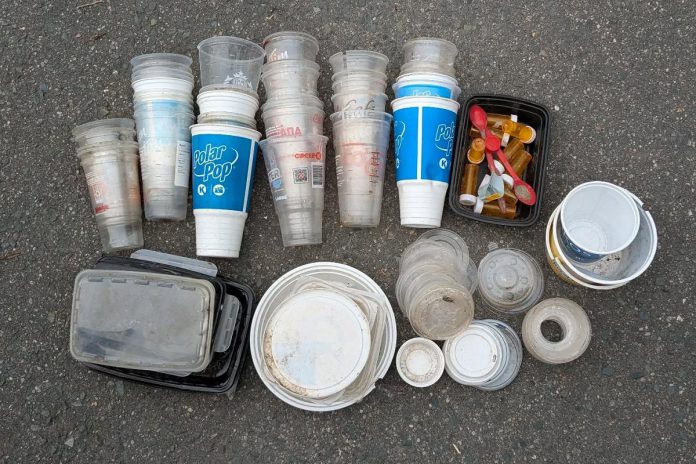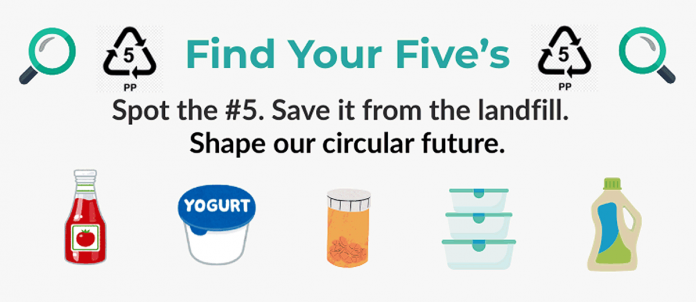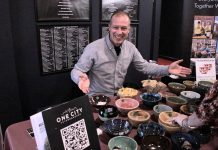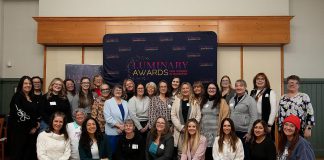
In Peterborough County alone, an estimated two million prescription pill bottles are distributed annually — but only 10 per cent are recycled, according to Clean Up Peterborough.
Bottles holding the pills are classified as a #5 plastic, also known as polypropylene (PP), which is a plastic that’s widely used but rarely recycled through curbside collection programs.
Clean Up Peterborough has launched “Find Your Fives,” a new crowd-sourcing campaign to build a local list of the most common #5 plastic items.
Founder Steve Paul is asking residents to check pill bottles and containers holding other common products — such as yogurt cups, sour cream and margarine tubs, and some take-out lids — to see what number is stamped instead the triangular recycling symbol.
“We’re just asking people to flip over their plastic, look for the #5 recycling symbol, and tell us what they find,” Paul said in a media release. “It’s free, it’s easy, and it helps shape the future of our circular economy right here in Peterborough.”
Most people don’t realize that many everyday plastic items are made from PP, Paul noted. Even fewer know that despite best efforts, #5 plastic is one of the least recycled plastics in Canada, with estimates showing less than five per cent ever gets recycled.

“One of the biggest eye-openers for me when I began diving deeper into recycling education was realizing how few people know what those tiny numbers inside the recycling triangle — the resin codes 1 through 7 — actually mean,” Paul told kawarthaNOW.
“Many assume that if an item is plastic, it’ll get recycled just by putting it in the blue box. Unfortunately, that’s not the case.”
Canada’s national recycling rate is only around nine per cent, Paul explained, and a big reason for that is something called “wish-cycling”: tossing things into the bin that feel recyclable, but aren’t accepted or are too contaminated to process. As a result, a lot of those items end up in landfills or incinerators, not recycling plants.
“This campaign is about helping people look more closely at their plastic packaging,” Paul said. “By asking the community to identify and log #5 plastics, which are often overlooked but actually are recyclable in the right systems, we’re starting a conversation.”
With support from the Rotary Club of Peterborough and funding provided through the Rotary Environmental Innovators Fund grant, Clean Up Peterborough has purchased small-scale equipment — including a plastic shredder, heat press, and CNC router — that will soon form the core of a new micro-recycling and makerspace initiative called Second Nature Studio.
Although not a formal recycling facility, Second Nature Studio will focus on collecting, shredding, and repurposing specific plastics, starting with #5 plastics and eventually expanding to include some #2, #4, and 3D printing plastics.
The studio will also provide educational workshops, volunteer opportunities, and creative reuse projects aimed at keeping plastic waste local and out of landfills.
“The grants we’ve received don’t give us the answers — they give us the tools to engage the community,” Paul said. “This project is about learning, sharing, and building something new together. We want to treat plastic as a resource, not waste, and create a model of circular innovation that starts right here at home.”
Clean Up Peterborough is inviting individuals, families, businesses, and organizations to participate in the campaign by flipping over plastic items at home or work. If you find “5” inside the recycling symbol, let Clean Up Peterborough know by completing the form at forms.gle/9FberAuo9n4XNGH18.
In September, Clean Up Peterborough intends to release a community-built “accepted items” list based on submissions, which will help guide future collection efforts. Paul expects the full program launch, including plastic drop-off, to happen in the fall.
“It’s a small act with a big ripple effect,” Paul said. “When people become more aware of what’s recyclable and what’s not, they can begin to make more informed choices about what they buy and how they dispose of it.
“Over time, this kind of education can drive demand for better systems, better packaging, and real change.”

























